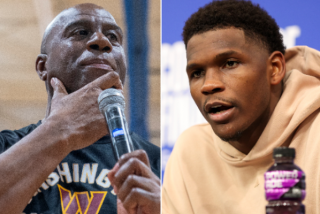THE RETURN OF MAGIC JOHNSON : Improvement in Magic’s Condition Paves the Way Back : Medical: Experts say that, though no one can ascertain the risk involved, there is no reason Johnson must not play again.
- Share via
An improvement in Earvin (Magic) Johnson’s condition was perhaps the overriding factor in his decision to return to the Lakers, a team physician said.
Michael Mellman, one of Johnson’s doctors, acknowledged Tuesday for the first time that the 6-foot-9 Laker guard has improved since announcing 10 months ago that he contracted the human immunodeficiency virus.
Mellman, an internist, attributed Johnson’s improvement to four factors: The use of the antiviral drug AZT; the fact that Johnson did not play in the NBA last season; a change of diet and exercise and a decrease in travel.
Mellman doesn’t know how Johnson’s return to the Lakers will affect his condition. “We’re facing a new challenge in trying to define what Earvin’s health is likely to be,” Mellman said.
“We can theorize as much as we want. The problem is we haven’t had anyone in this position before. The only thing that we’ll know is what happens in this experiment called ‘Earvin Johnson.’ ”
Johnson said Tuesday that his T-helper cell count has increased, but refused to reveal any specifics. It was believed to be about 500 per cubic milliliter of blood when he started AZT treatment last year. Normal levels range from 800 to 1,200.
T-helper cells are critical parts of the body’s immune system, and AZT--or zidovudine--is thought to initially boost the cell count for six to eight months in HIV patients. Eventually, as T-helper cell counts drop progressively lower, the body’s immune system finds it more and more difficult to fight off infection.
Johnson emphasized in a news conference at the Forum that his decision to return feels right. Relaxed and joking, he said he knew he was ready for the rigors of the NBA after preparing for the Barcelona Olympics with 11 all-star teammates. Johnson said he has increased his weight and strength while training this summer, a factor that immunologists believe enhanced his immune system.
“I’m 235 pounds now, with more muscles than I ever dreamed of,” Johnson said. “My body has changed, and I can say (Laker trainer) Gary Vitti has really been working me out really hard, and I’ve been enjoying it. I’m ready to go.”
But Johnson also is aware of the potential risks involved in returning to basketball.
“It is a fact he is assuming a risk, the magnitude which we don’t know,” Mellman said. “He also assumed a risk in not playing.
“I don’t think anyone has any false thoughts here. I think Earvin knows the risk is that there may be problems.”
Mellman said he and Johnson’s other doctor, David Ho, the director of New York University’s Aaron Diamonds AIDS Research Center, have seen positive signs in the past 10 months.
Ho, in Europe, could not be reached Tuesday.
Although encouraged by recent test results, the doctors will now focus on how Johnson’s immune system will react to the stresses of the NBA. Johnson, as is his wont, will not be satisfied to simply return to the court. A fierce competitor, he no doubt will try to return the Lakers to the championship level to which he is accustomed.
The mental strain could have a detrimental effect, said Robert T. Schooley, head of the infectious diseases division of the University of Colorado Health Sciences Center. But the data is limited on what could happen, he added.
“Recommendations to play or not to play are tough, but one thing available is 10 months of his natural history,” Schooley said.
That offers doctors some reassurance about allowing Johnson to increase his activity, Schooley said, adding that treatment does not need to be as conservative as when the diagnosis was made.
Mellman, who handled AIDS-related cases when he and Ho were residents at Cedars-Sinai Medical Center in Los Angeles in the early 1980s, said he had advised Johnson to go slowly.
Mellman said treatment might change as Johnson’s situation changes. Characterizing the case as unique, Mellman said he was not sure what the treatment would entail.
“You try to adjust as you go,” he said.
Experts said Tuesday that little is known about the effects of exercise on the progression of an HIV infection.
“There simply aren’t any well-conducted studies that definitively answer that question,” said Dr. Martin Hirsch of Harvard Medical School.
But experts generally supported Johnson’s decision to play.
Dr. Anthony Fauci, director of AIDS activities for the government’s National Institutes of Health and director of the National Institute of Allergy and Infectious Diseases applauded Johnson.
“If he feels well enough to play, he should play,” Fauci said. “In fact, it might do him some good, if you’re doing something you really enjoy. If anything, I would think it would be good for him.
“There is no medical reason, immunologically speaking, that would keep him from coming back. If you look at the guy--especially after his performance in the Olympics--he doesn’t indicate that he has anything wrong with his physical conditioning. And that’s the thing that should help him decide--not what his T cells are.”
Times staff writers Marlene Cimons in Washington and Thomas H. Maugh II in Los Angeles contributed to this report.
More to Read
All things Lakers, all the time.
Get all the Lakers news you need in Dan Woike's weekly newsletter.
You may occasionally receive promotional content from the Los Angeles Times.






